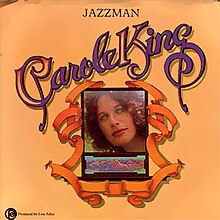
"Ain't Nothing Like the Real Thing" is a 1968 single released by American R&B/soul duo Marvin Gaye and Tammi Terrell, on the Tamla label in 1968. The B-side of the single is "Little Ole Boy, Little Ole Girl" from the duo's United LP. The first release off the duo's second album: You're All I Need, the song—written and produced by regular Gaye/Terrell collaborators Ashford & Simpson—became a hit within weeks of release eventually peaking at number eight on the US Billboard Hot 100 and number one on the Hot Soul Singles chart, the first of the duo's two number-one R&B hits. In the UK "Ain't Nothing Like the Real Thing" reached number 34.

"Breaking Up Is Hard to Do" is a song recorded by Neil Sedaka, co-written by Sedaka and Howard Greenfield. Sedaka recorded this song twice, in 1962 and 1975, in two significantly different arrangements, and it is considered to be his signature song. Between 1970 and 1975, it was a top-40 hit three separate times for three separate artists: Lenny Welch, The Partridge Family and Sedaka's second version. The song was also adapted into multiple languages, most notably in Italian and French.

"Deacon Blues" is a song written by Walter Becker and Donald Fagen in 1976 and recorded by their group Steely Dan on their 1977 album Aja. It peaked at number 19 on the Billboard charts and number 17 on the U.S. Cash Box Top 100 in June 1978. It also reached number 40 on the Easy Listening chart. In Canada, it peaked at number 14, a position it occupied for two weeks, and number 20 Adult Contemporary. In 2021, it was listed at No. 214 on Rolling Stone's "Top 500 Greatest Songs of All Time".

"All I Ever Need Is You" is a popular song written by Jimmy Holiday and Eddie Reeves, and initially recorded by Ray Charles for his 1971 album, Volcanic Action of My Soul. The most well-known version of the song is the hit single by Sonny & Cher which, in 1971, reached No. 7 on the U.S. Billboard Hot 100, and was their single of greatest chart longevity, spending 15 weeks on that chart. Their album by the same title sold over 500,000 copies reaching RIAA gold status.
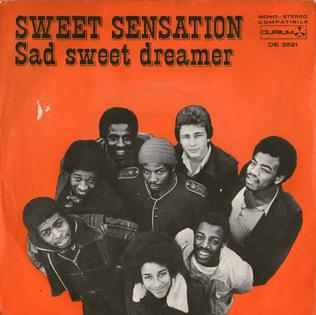
"Sad Sweet Dreamer" is a song by Sweet Sensation, which was a number-one single on the UK Singles Chart for one week in October 1974.
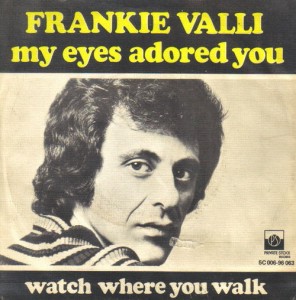
"My Eyes Adored You" is a 1974 song written by Bob Crewe and Kenny Nolan. It was originally recorded by The Four Seasons in early 1974. After the Motown label balked at the idea of releasing it, the recording was sold to lead singer Frankie Valli for $4000. After rejections by Capitol and Atlantic Records, Valli succeeded in getting the recording released on Private Stock Records, but the owner/founder of the label, Larry Uttal, wanted only Valli's name on the label. It is from the album Closeup. The single was released in the US in November 1974 and topped the Billboard Hot 100 in March 1975. "My Eyes Adored You" also went to number 2 on the Easy Listening chart. Billboard ranked it as the No. 5 song for 1975.

"(I've Been) Searchin' So Long" is a song written by James Pankow for the group Chicago and recorded for their album Chicago VII (1974). The first single released from that album, it reached number 9 on the U.S. Billboard Hot 100. It also hit number 8 on the Adult Contemporary chart. In Canada, the song peaked at number 5.

"Baby, What a Big Surprise" is a ballad written by Chicago's then bassist/singer Peter Cetera, which appeared on their album Chicago XI (1977), with Cetera singing lead vocals. The first single released from the album reached number 4 on the US Billboard Hot 100 chart.
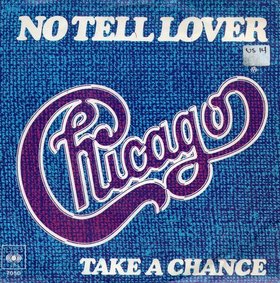
"No Tell Lover" is a song written by Lee Loughnane, Danny Seraphine, and Peter Cetera for the group Chicago and recorded for their album Hot Streets (1978), with Cetera and Donnie Dacus singing lead vocals. The second single released from that album, it reached No. 14 on the U.S. Billboard Hot 100 chart and No. 5 on the adult contemporary chart.

"Whatcha Gonna Do?" is a song by American rock group Pablo Cruise. This song was written by David Jenkins and Cory Lerios, two of the band's members. "Whatcha Gonna Do?" was a track from their album A Place in the Sun in 1977.

"Yesterday's Songs" is a 1981 single by Neil Diamond from his album On the Way to the Sky. The song was a major adult contemporary radio hit, spending six weeks at #1 on the U.S. Billboard chart and four weeks atop the Canadian Adult Contemporary chart. On the Billboard Hot 100, it peaked at #11. On the Canadian pop charts, the song reached #15. "Yesterday's Songs" is ranked as the 77th biggest American hit of 1982.

"Roll On down the Highway" is a song written by Fred Turner and Robbie Bachman, first recorded by Canadian rock group Bachman–Turner Overdrive (BTO) for their 1974 album Not Fragile. The lead vocal is provided by Turner.

“Sweet Seasons” is a song written by Carole King and Toni Stern which appeared on King's 1971 album Music. It was the only charting single from the album, and was her second of four Top 10 hits in the US.

"Take It Easy on Me" is a song by Australian soft rock band Little River Band, released in March 1982 as the third and final single from the album Time Exposure. The song reached No. 10 on the U.S. Billboard Hot 100, becoming their sixth and last top 10 hit on the chart and also reached No. 14 on the Adult Contemporary chart. The song was written by band member Graham Goble and produced by British record producer George Martin.
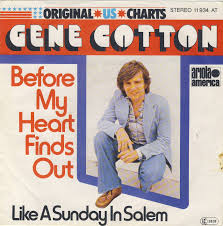
"Before My Heart Finds Out" is a 1978 single and hit song by Gene Cotton. It was the debut single from his eighth album, Save the Dancer.

"Friends" is a song written by English musician Elton John and songwriter Bernie Taupin, and performed by John. It was John's third U.S. hit, and his second to reach Top 40 after the breakthrough success of "Your Song".
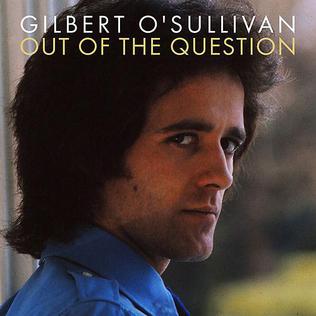
"Out of the Question" is a popular song by Irish singer Gilbert O'Sullivan. It was written by O'Sullivan and produced by Gordon Mills.

"Sweet Dreams" is a song by English/Australian soft rock duo Air Supply from their sixth album, The One That You Love. The song reached No. 5 on the Billboard Hot 100 and No. 4 on the Adult Contemporary chart in early 1982. The song also reached No. 8 on Cash Box. In Canada, it peaked at No. 14 on the RPM Top 100 and No. 15 on the Adult Contemporary chart.

"Breakdown Dead Ahead" is a 1980 song recorded by Boz Scaggs, and composed by Scaggs and David Foster. It was the lead single of two released from Scaggs's album Middle Man.
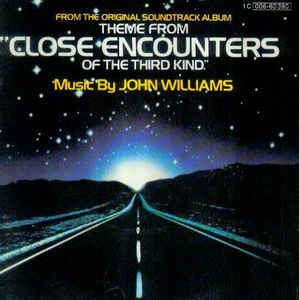
"Theme from Close Encounters of the Third Kind" is a 1978 instrumental hit single by composer John Williams. It is the main theme of the soundtrack of the movie of the same name. The song became a hit in the United States (#13) and Canada (#12) during the winter of that year.
